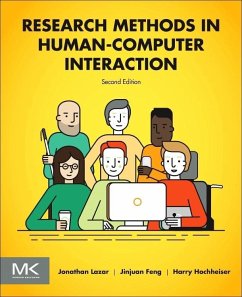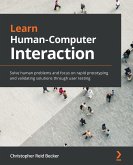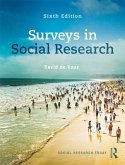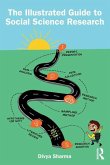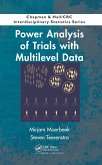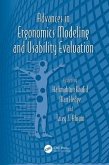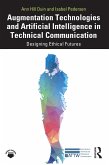Research Methods in Human-Computer Interaction is a comprehensive guide to performing research and is essential reading for both quantitative and qualitative methods. Since the first edition was published in 2009, the book has been adopted for use at leading universities around the world, including Harvard University, Carnegie-Mellon University, the University of Washington, the University of Toronto, HiOA (Norway), KTH (Sweden), Tel Aviv University (Israel), and many others. Chapters cover a broad range of topics relevant to the collection and analysis of HCI data, going beyond experimental design and surveys, to cover ethnography, diaries, physiological measurements, case studies, crowdsourcing, and other essential elements in the well-informed HCI researcher's toolkit. Continual technological evolution has led to an explosion of new techniques and a need for this updated 2nd edition, to reflect the most recent research in the field and newer trends in research methodology.
This Research Methods in HCI revision contains updates throughout, including more detail on statistical tests, coding qualitative data, and data collection via mobile devices and sensors. Other new material covers performing research with children, older adults, and people with cognitive impairments.
Hinweis: Dieser Artikel kann nur an eine deutsche Lieferadresse ausgeliefert werden.
This Research Methods in HCI revision contains updates throughout, including more detail on statistical tests, coding qualitative data, and data collection via mobile devices and sensors. Other new material covers performing research with children, older adults, and people with cognitive impairments.
Hinweis: Dieser Artikel kann nur an eine deutsche Lieferadresse ausgeliefert werden.
"This book is an outstanding contribution to HCI s pedagogical and reference literature, reviewing and explaining the numerous research methods in common use. It motivates with numerous examples the methods in terms of posing questions and designing research to answer those questions. It covers well both quantitative and qualitative methods. The treatment is accessible and lively. The book should be considered for adoption by all HCI instructors." --Ron Baecker, Member of the CHI Academy, Founder and Co-Director, Technologies for Aging Gracefully lab (TAGlab), and Emeritus Professor of Computer Science, University of Toronto
"This is the research methods book I recommend to my students and colleagues. And it's a time-saver: my students make fewer methodological mistakes and we can now engage in deeper and more insightful discussions about specific challenges of their research work. With this improved and updated edition, the bar is even higher! With increasing traces of our lives online and availability of Big Data in many research projects, the new chapter on online and ubiquitous HCI research was a welcome addition to the already comprehensive, multi-method research book. Every HCI student, researcher, and practitioner must read it!" --Simone Barbosa, Professor, PUC-Rio, Brazil, and co-Editor-in-Chief of ACM Interactions
"Research Methods in HCI is an excellent resource for newcomers and seasoned HCI professionals alike. Covering all the basic methods for conducting research in HCI, concepts are explained clearly and brought alive through case studies and examples. In addition to offering how-to details, the text offers detailed rationale for why and when to use different methods. Some historical context and controversial viewpoints are also offered. Clear discussions around how to select participants and work with different populations are offered, as are ethical issues in conducting research. The attention to these kinds of details makes this a truly engaging, readable text. The extensive list of references offers plenty of scope for follow-up for those wishing to deepen their knowledge even further. The 2nd edition offers new and refreshed content, updated examples and case studies, and new references and resources." --Elizabeth Churchill, Member of the CHI Academy, Secretary/Treasurer of ACM, currently Director of User Experience at Google, formerly Director of Human Computer Interaction at eBay
"This book by Lazar, Feng, and Hochheiser is a must read for anyone in the field of Human-Computer Interaction. Their multi-discipline approach, housed in the reality of the technological world today, makes for a practical and informative guide for user interface designers, software and hardware engineers and anyone doing user research" --Mary Czerwinski, Principal Research Manager, Microsoft Research, Recipient of the ACM SIGCHI Lifetime Service Award, Member of the CHI Academy, and ACM Fellow
"This is a superb book for all researchers, practitioners, and students interested in the investigation of anything related to HCI. This new edition has much needed information on research methods in HCI that have become prevalent, including crowdsourcing as well as new creative ways to collect and analyze qualitative data, two examples of essential skills for today's HCI students! Highly recommended!" --Vanessa Evers, Full Professor and Chair of Human Media Interaction, Scientific Director of the DesignLab, University of Twente, the Netherlands
"This is the research methods book I recommend to my students and colleagues. And it's a time-saver: my students make fewer methodological mistakes and we can now engage in deeper and more insightful discussions about specific challenges of their research work. With this improved and updated edition, the bar is even higher! With increasing traces of our lives online and availability of Big Data in many research projects, the new chapter on online and ubiquitous HCI research was a welcome addition to the already comprehensive, multi-method research book. Every HCI student, researcher, and practitioner must read it!" --Simone Barbosa, Professor, PUC-Rio, Brazil, and co-Editor-in-Chief of ACM Interactions
"Research Methods in HCI is an excellent resource for newcomers and seasoned HCI professionals alike. Covering all the basic methods for conducting research in HCI, concepts are explained clearly and brought alive through case studies and examples. In addition to offering how-to details, the text offers detailed rationale for why and when to use different methods. Some historical context and controversial viewpoints are also offered. Clear discussions around how to select participants and work with different populations are offered, as are ethical issues in conducting research. The attention to these kinds of details makes this a truly engaging, readable text. The extensive list of references offers plenty of scope for follow-up for those wishing to deepen their knowledge even further. The 2nd edition offers new and refreshed content, updated examples and case studies, and new references and resources." --Elizabeth Churchill, Member of the CHI Academy, Secretary/Treasurer of ACM, currently Director of User Experience at Google, formerly Director of Human Computer Interaction at eBay
"This book by Lazar, Feng, and Hochheiser is a must read for anyone in the field of Human-Computer Interaction. Their multi-discipline approach, housed in the reality of the technological world today, makes for a practical and informative guide for user interface designers, software and hardware engineers and anyone doing user research" --Mary Czerwinski, Principal Research Manager, Microsoft Research, Recipient of the ACM SIGCHI Lifetime Service Award, Member of the CHI Academy, and ACM Fellow
"This is a superb book for all researchers, practitioners, and students interested in the investigation of anything related to HCI. This new edition has much needed information on research methods in HCI that have become prevalent, including crowdsourcing as well as new creative ways to collect and analyze qualitative data, two examples of essential skills for today's HCI students! Highly recommended!" --Vanessa Evers, Full Professor and Chair of Human Media Interaction, Scientific Director of the DesignLab, University of Twente, the Netherlands

